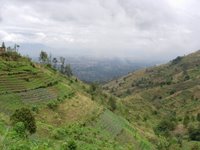Monday, October 23, 2006
Thursday, October 19, 2006
My Tanzanian Family
A father, mother, two brothers, and three sisters live within the same family compound as I, the newest member of the family. The walls of the home by no means delineate the boundaries of the family, however. The cast of relatives is too large for me to know in the brief ten-weeks of my stay, even though many of them live in the houses immediately surrounding ours. Kiswahili reflects this broad conception of the family: Uncles on my father’s side of the family are known as baba mdogo (literally: younger father) and baba mkubwa (Elder Father), and a similar structure is found on the mother’s side regarding Aunts. A close family friend can even be called dada/kaka (brother/sister), and many families, including mine, have housegirls who have effectively become members of the family (though they do earn a salary).
Domestic Life
Kutupa takataka -or- To take out the trash
Gathering the accumulated refuse of the week, mostly plastic bottles and papers amassed in a plastic bag, I told my host brother (kaka) that I needed to take out the trash. We went to the kitchen door, he entered, and returned, much to my surprise, with a box of matches. Exiting our home from the rear, we went to the edge of a steep hill, which quickly descends to a small river. Atop this hill lies our backyard of about 200 square feet. Placing the bag of trash on the ground, kaka lights it on fire. The bottles heat and each in turn gives a sharp sigh of relief as the heated, trapped air is finally released. The paper to ash, the bottles only half melted, “Done,” kaka states with a tone of finality.
Kufua nguo –or- To wash clothes
In a bucket, that is. No electric washer or dryer. It is just as well, power in Morogoro is sporadic right now. A lengthy drought has starved the largely hydroelectric powered circuits of this country recently. Its severity has disrupted business as usual (kaka, a taxi driver, needs a certain electrical instrument to fix the tire of his car, but without electricity can only wait…) and even prompted a downward revision of expected economic growth for the country as a whole. The generators on the main road in Morogoro are silent, humming, or growling depending on the day and one’s proximity. Thankfully, washing all clothing out of 5 gallon buckets frees us from this dependency. A certain violent, repetitious hand motion is used to tear filth from all parts of one’s clothing. The experience is notable to one familiar with electric washers for the abrasions it will create on inexperienced hands, its lengthy duration, the quantity of water used, and its disposal. Pouring the soapy, dirty water into a drain, it is promptly carried outside of the family compound via pipe straight into the small river out back. I had never really questioned where
Kuoga -or- To Bathe
Again, from a bucket. ‘nuff said.
Monday, October 02, 2006
The Effect of 1 Liter of Tanzanian Tap Water on the Unaccustomed Stomach: Dysentery!
Preceded by 4 days of diarrhea.
Results: Now solidified.
Conclusions: Supports the idea that unfiltered water is unsafe to drink. Though not a part of this study, boiling and filtering of water may reduce chances of such illness.
Unsure where the compound begins and ends, I start jogging in the night down a dirt road. Surely walls must enclose the entire compound? ¼ mile along, the trees on my left part, reveal a hulking, concrete skeleton that once was or was once meant to be 4 stories. There is no gate in sight, no retaining walls, no people, and the road is now unlit. The fence at the roadside has gone from rock mortar to barbed wire to underbrush. Time to turn around. Running back I glance left and a figure suddenly materializes. Dark as the night, wrapped in blackest clothe, only subtle navy stitchwork and the whites of eyes gave hint. The eyes are watching my jog, silently tracking, the body statue still. I must have run by this person not a minute ago, completely oblivious, believing the road abandoned. Jog on... Jog on...
This first night there is a certain taste to the air in Dar es Salaam. My nearest analogy is the scent in the Reptile House of Brookfield Zoo. Heavy, stale, moist, it becomes a presence. Gravity feels weightier.
Desperate for air, I throw open the window of my sparse, lonely single. Within minutes, a surprising buzz, and the discovery that my room in now swarming with company. I quickly pull the screen over the window. Silly me, I forgot about those pesky mosquitos. Thankfully my bed is decked in sumptuous bridal vale to keep the malaria out. Lala salama (sleep in peace).
Eyes fly open to mournful, plaintive wailings. A distantly broadcast voice welcomes Muslims and any other in earshot into a new day. As it rises and falls in measured, rhythmic pace, my watch glows 5:05. Even as the nearest voice ceases, other, more distant voices from other directions take up the call, rise and fall in their own right.

